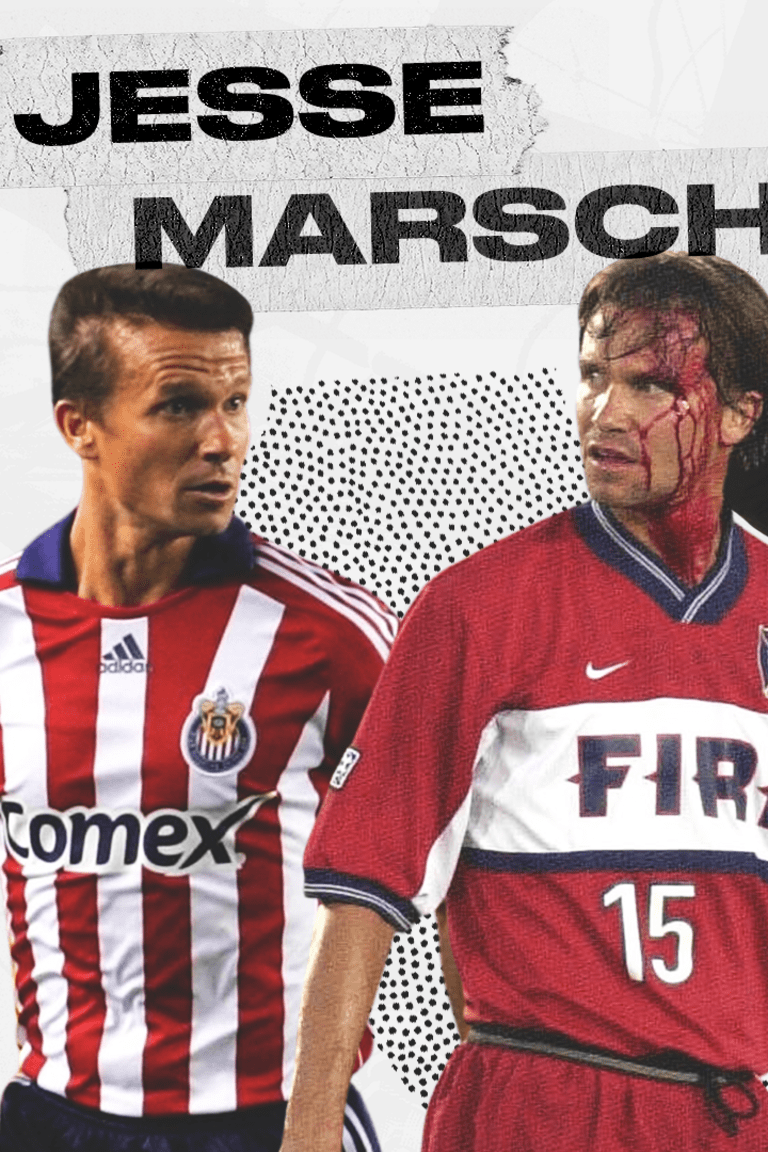The making of Jesse Marsch in MLS predates the league’s inception. It goes back to when he was in college.
Marsch, a boy from a small Wisconsin city called Racine, was recruited to play soccer at Princeton University under head coach Bob Bradley, among the country’s most decorated male soccer coaching minds and someone who would become a trailblazer. He’d spend the better part of the next quarter-century with Bradley – from Princeton to D.C. United, then Chicago Fire FC and Chivas USA before getting his first coaching job as an assistant under Bradley with the US men’s national team.
Along the way, Marsch learned and developed his own ideas, made his own connections and a ton of his own memories, as a hugely successful MLS player and then a Supporters’ Shield-winning head coach with the New York Red Bulls. From there, he embarked on a coaching career in Europe with RB Salzburg and RB Leipzig.
Now at Leeds United, Marsch follows a path first forged by Bradley, who was the first American-born head coach of a Premier League team when he (briefly) was in charge at Swansea City. Marsch inherited a sinking ship at Leeds but has steered it immediately, doing things his way and leading the group away from the relegation zone. They are currently on a four-game unbeaten run after a commanding 3-0 win over Watford last weekend.
MLSsoccer.com spoke with a number of folks who knew Marsch best at various stops in MLS, from his playing days to his first coaching job with the Montréal Impact (now CF Montréal) and then becoming a household name with the New York Red Bulls.
Chicago Fire competitiveness and scuffles
Jesse Marsch’s professional career began with D.C. United during MLS’s inaugural 1996 season, but he made his name in Chicago with the Fire. Bob Bradley was an assistant under Bruce Arena at D.C. United for the league’s first two seasons, then was named head coach of Chicago for their expansion season in 1998. He brought Marsch there.
Marsch would go on to make 200 appearances for the Fire, in an atmosphere that suited his fiery, competitive nature.
“We got under each other’s skin,” Philadelphia Union head coach Jim Curtin said. Curtin joined the Fire in 2001, where he was Marsch’s teammate until 2005, then again in 2008-09 with Chivas USA. “There were fistfights all the time, that was a common occurrence. Jesse had a way of competing, it wasn’t uncommon that punches were thrown. Let’s just say we’ll leave out some details, but, yeah, that wasn’t uncommon.”
Austin FC head coach Josh Wolff, a fellow original member of the Fire with Marsch and his first roommate, recalled those details, including a one-punch knockout by Ante Razov.
“Yeah, plenty of good stories,” Wolff said. Wolff played for Chicago from 1998-2002. “Jesse got knocked out by Ante in training in one punch; He got thrown out of a training because he took a cheap shot. There was plenty of animosity between players. Jesse didn’t back down, other players didn’t back down either.”
Training altercations were left between the white lines of the pitch, quickly forgotten and moved on from in that ultra-competitive group. In fact, the morning after that fight with Razov and Marsch, the pair were in the same car heading to training together.
“In hindsight, it was a good thing,” Curtin said. “It made us all so competitive, it was a really cool locker room to be part of.”
It was like that from Curtin’s first day.
Curtin arrived with the team in 2001 fresh out of college, after the Fire’s three-year run of two US Open Cup titles and one MLS Cup. It was a bit of a jump in quality and pace for the former Villanova star, and his first training session didn’t quite go to plan.
“You get thrown off a plane off that, and you might be a good college player, but you learn pretty quickly you’re not at their level,” Curtin said. “And it was probably the beers I had the night before, but I timed a challenge – let’s just say very poorly – on Piotr Nowak. It was so bad, Bob ended the session. I walked away with Jesse, sat in the van and I turned to him – and I didn’t know Jesse at all – and said, ‘Well, at least I can say I fouled Piotr Novak before my career ended.’ I’m thinking that was the end of things. He laughed and appreciated I was self-deprecating, and a friendship was born from that.”
Curtin and Marsch carpooled together during their time in Chicago and Chivas. They remain close to this day, with a lifetime of memories on and off the field.
“Thank god there were no cell phones in those days,” Curtin said with a laugh.
Marsch remained that way through the twilight of his career. It’s just who he is; you can’t really turn that off.
From Chicago he went to Chivas USA, as did Curtin, where they played with rising rookie Sacha Kljestan. Kljestan was taken fifth overall at the 2006 MLS SuperDraft, was a finalist for 2006 MLS Rookie of the Year and would be destined for a successful career in MLS, Europe and with the USMNT. His first stop was as Marsch’s midfield partner with Chivas.
“I’d say for the majority of my rookie year, I didn’t really like Jesse that much,” Kljestan said. “He was always on me. He was the old guy who had been around the block and I was the rookie who thought I knew better.”
The pair spent four years playing together, with Kljestan crediting Marsch for aiding his development.
Kljestan would go on to Anderlecht, becoming a fan favorite as an integral part of Belgian league-winning sides, then join up with Marsch as a centerpiece of those New York Red Bulls teams he coached



